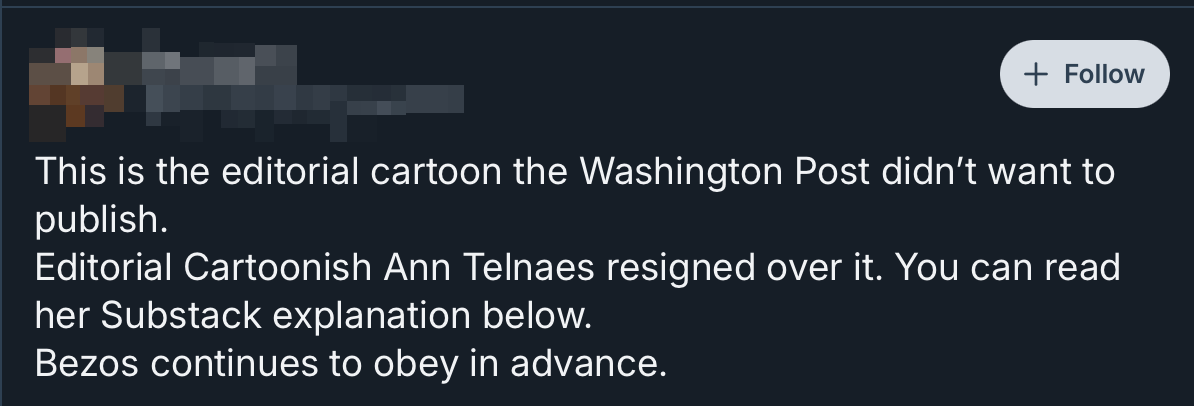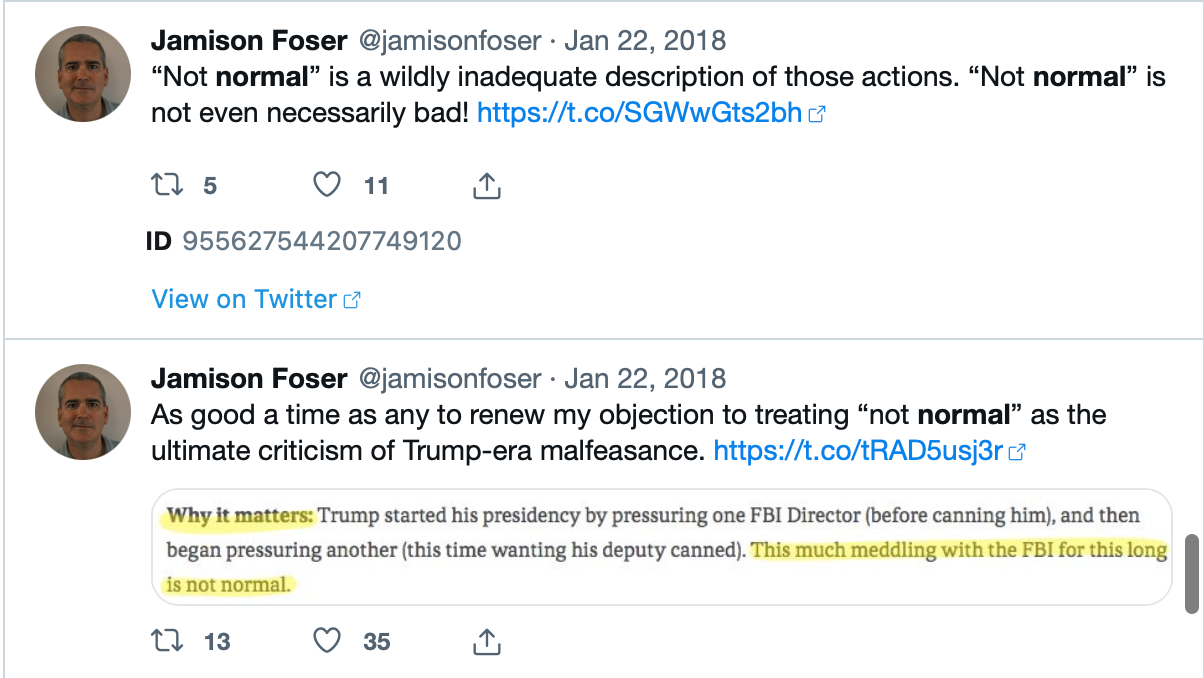No, Jeff Bezos is not "obeying in advance"

Ann Telnaes, a giant of the editorial cartoonist world who won the Pulitzer Prize in 2001, has resigned from The Washington Post after the paper killed a cartoon she submitted depicting Post owner Jeff Bezos (among others) negatively. Telnaes explains:
I’ve never had a cartoon killed because of who or what I chose to aim my pen at. Until now.
The cartoon that was killed criticizes the billionaire tech and media chief executives who have been doing their best to curry favor with incoming President-elect Trump. … The group in the cartoon included Mark Zuckerberg/Facebook & Meta founder and CEO, Sam Altman/AI CEO, Patrick Soon-Shiong/LA Times publisher, the Walt Disney Company/ABC News, and Jeff Bezos/Washington Post owner.
Washington Post opinion editor David Shipley offered the kind of obviously-false explanation you only utter when you know admitting the truth will make you look even worse:
David Shipley, The Post’s opinions editor, said in a statement that he respected Ms. Telnaes and all she had given to The Post “but must disagree with her interpretation of events."
“Not every editorial judgment is a reflection of a malign force,” Mr. Shipley said in the statement. “My decision was guided by the fact that we had just published a column on the same topic as the cartoon and had already scheduled another column — this one a satire — for publication. The only bias was against repetition.”
Look, this is bullshit. It is risible to suggest that the world’s most powerful billionaires — men who control Facebook, Amazon, The Washington Post, the Los Angeles Times, Disney, ABC News, and OpenAI — aligning themselves with an aspiring autocrat is unworthy of two columns (one satirical) and a drawing.
And Shipley’s claim that the Post opinion section has a “bias … against repetition”? As I write this, at 8:50 pm on January 41 the main page of the opinion section at WashingtonPost.com currently features the following:
“The 10 worst things Biden did in 2024” by Marc Thiessen
“The 10 best things Biden did in 2024” by Marc Thiessen
“24 good things that happened in 2024” by the Editorial Board
“2025 promises to be tumultuous. Here’s our New Year’s resolution” by the Editorial Board
“How poker players keep New Year’s resolutions” by Annie Duke
“Classifying New Year’s resolutions,” a cartoon by Edith Pritchett
“Bringing in the New Year,” a cartoon by by Ann Telnaes
Clearly this is not an opinion section that has a “bias … against repetition.” Just as clearly, the Post’s explanation for spiking Telnaes’ cartoon is bullshit. It is a defense so preposterous it serves as unwitting acknowledgment of the most obvious — and damning — interpretation of the Post’s actions: The Post spiked Telnaes’ cartoon because of its portrayal of Post owner Jeff Bezos. That’s bad for all the obvious reasons, most of which are at this point pretty well-established.3
My reaction to all of this is rather simple, and probably pretty predictable: Jeff Bezos should not own The Washington Post.
But what really interests me is a common reaction I’ve seen from others. I have been almost entirely offline the last two weeks4 but when I saw the Telnaes news in my email during an unscheduled 24-hour layover in San Juan5 I took a quick look at Bluesky6 for reactions and a theme quickly emerged there and elsewhere: “Obeying in advance.”
Here’s an example, from Barton Gellman, whose distinguished career in journalism7 included 21 years at The Washington Post:

Gellman’s illustrious journalism career and decades of work at the Post make his criticism of the paper particularly damning, and important. But the apparent suggestion that in spiking Telnaes’ cartoon the Post was “obeying in advance” strikes me as a bit off target, in a way I’ve been meaning to address for quite a while.
You’ve probably encountered some form the phrase “obey in advance” dozens of times the last few months. It’s a great phrase, and I have come to hate it. Or, rather, its overuse.
The origins are simple enough: Timothy Snyder, author of the books “On Fascism” and “On Freedom,” argues that “‘do not obey in advance’ is the main lesson of the twentieth century,” explaining:
Most of the power of authoritarianism is freely given. In times like these, individuals think ahead about what a more repressive government will want, and then offer themselves without being asked. A citizen who adapts in this way is teaching power what it can do.
“Do not obey in advance” is the first lesson in On Tyranny. It’s a good one. And the phrase, in its various forms, has become the most trendy in politics over the last few months, for reasons you can probably guess. It’s a simple, catchy phrase that doesn’t require a lot of explanation and that conveys an important point. That’s all to Snyder’s credit.
The problem is that when a phrase like that appears on the scene, capturing the zeitgeist and reflecting both the fears and the defiance of millions, it tends to get used … and used … and abused. And, more importantly, reflexively applied in situations in which it really is not adequate.
On November 15, the New York Times ran an op-ed headlined “End the Criminal Cases Against Trump” that was widely disparaged for “obeying in advance.” At the the time I began writing a piece that would have been a lot like this one, had I finished it. Here’s a portion of that unpublished draft:
Publication of the op-ed was swiftly met with ridicule for “obeying in advance” – the trendy, useful phrase for the act of giving in to a fascist’s illegitimate action before the action even occurs. But there are things worse than obeying in advance. Much worse. Obeying Donald Trump’s likely moves to end the criminal cases against him would require nothing more than staying silent about them. [Thomas] Goldstein and the New York Times chose instead to actively help Trump end the criminal cases against him; to argue on his behalf. They are not obeying in advance, they are assisting in advance.
“Do not obey in advance” is great advice and a useful reminder to ourselves and to those we are confident share our values and our goals. But as a criticism of others, it often falls far short of the mark.
Here’s an illustrative post from another Bluesky user:8

Jeff Bezos’s Washington Post spiking a cartoon that portrayed Jeff Bezos harshly is not an example of Jeff Bezos obeying Donald Trump in advance. It is an example of Jeff Bezos’s malign rule over the Post.9 Bezos is the autocrat in this scenario, not the supplicant.
A whole lot of people — many of them quite powerful, many of them not — are reacting to the rise of autocracy in America not by “obeying in advance” but by gleefully lending a hand, either because they enthusiastically support right-wing autocracy or because they think they can use it for their own ends. Either way, we need a harsher — and more accurate — condemnation for them than “obeying in advance.”
I am reminded of one of the catchphrases of the first Trump administration: This is not normal. Like “obey in advance” it’s easy to see why the phrase and its variants took off. It expressed something important, in a clear and concise way. But it, too, is often inadequate to the moment.


“This is not normal” and “that’s obeying in advance” are both trendy Trump-era critiques that capture something important but are often inadequate to the actions they describe. Perhaps they’ve become trendy in part because they are inadequate. They feel clear-eyed and defiant — who among us doesn’t want to feel clear-eyed and defiant right now? — but also offer the comfort of stopping short of looking the problem full in the face.
Atlantic Standard Time ↩
I had no idea… ↩
At this point it is useful to recall Bezos’s own ham-handed defense of his decision to spike a Post endorsement of Kamala Harris in late October. ↩
Highly recommended! ↩
Thanks, United! ↩
Like Twitter But Fewer Nazis™ ↩
Gellman has won pretty much every award there is to win, many of them two or three times. ↩
I’ve obscured the poster’s identity because as far as I know the poster is not a notable public figure. ↩
If Trump saw the cartoon he would likely have loved it. ↩
Member discussion